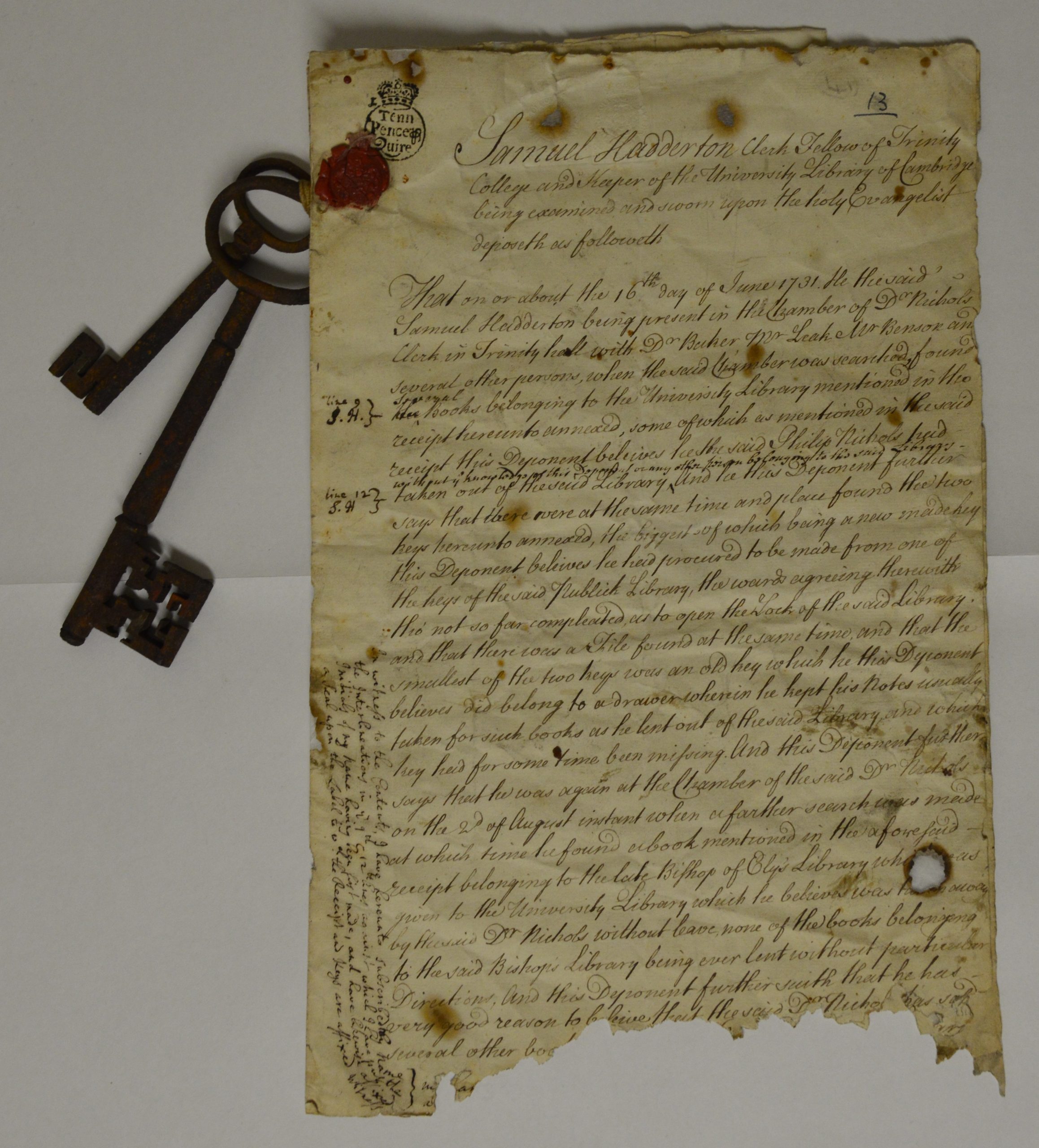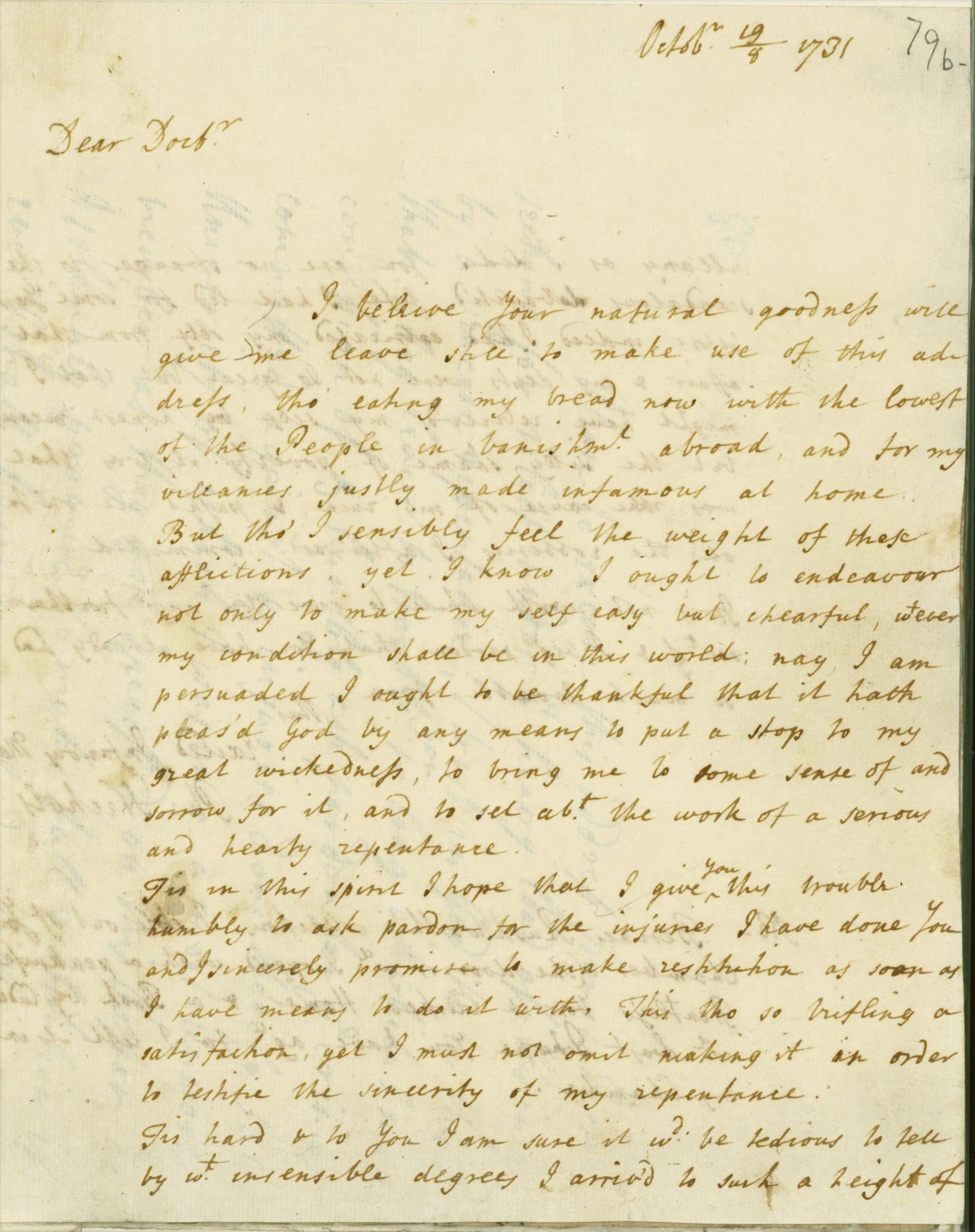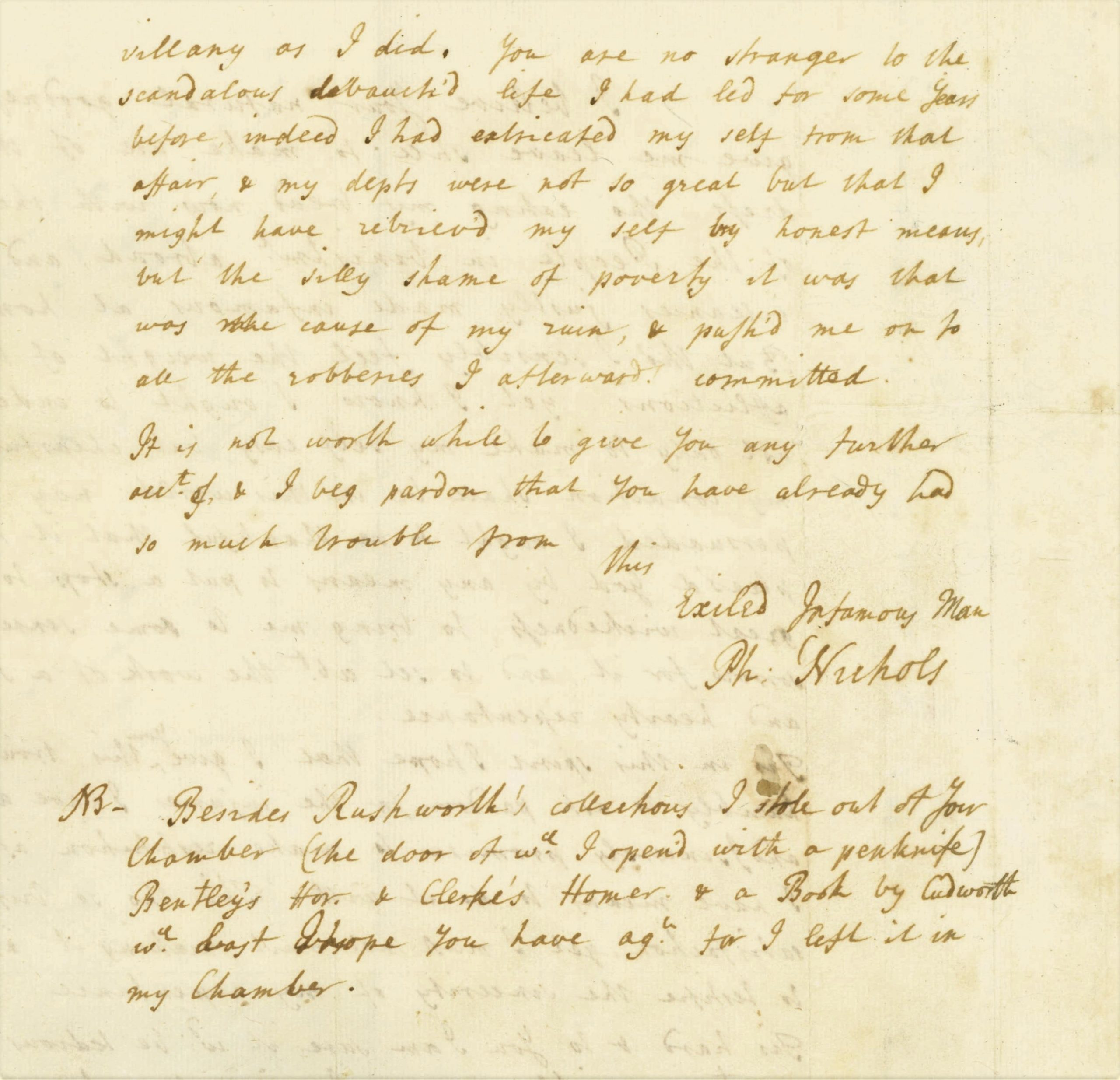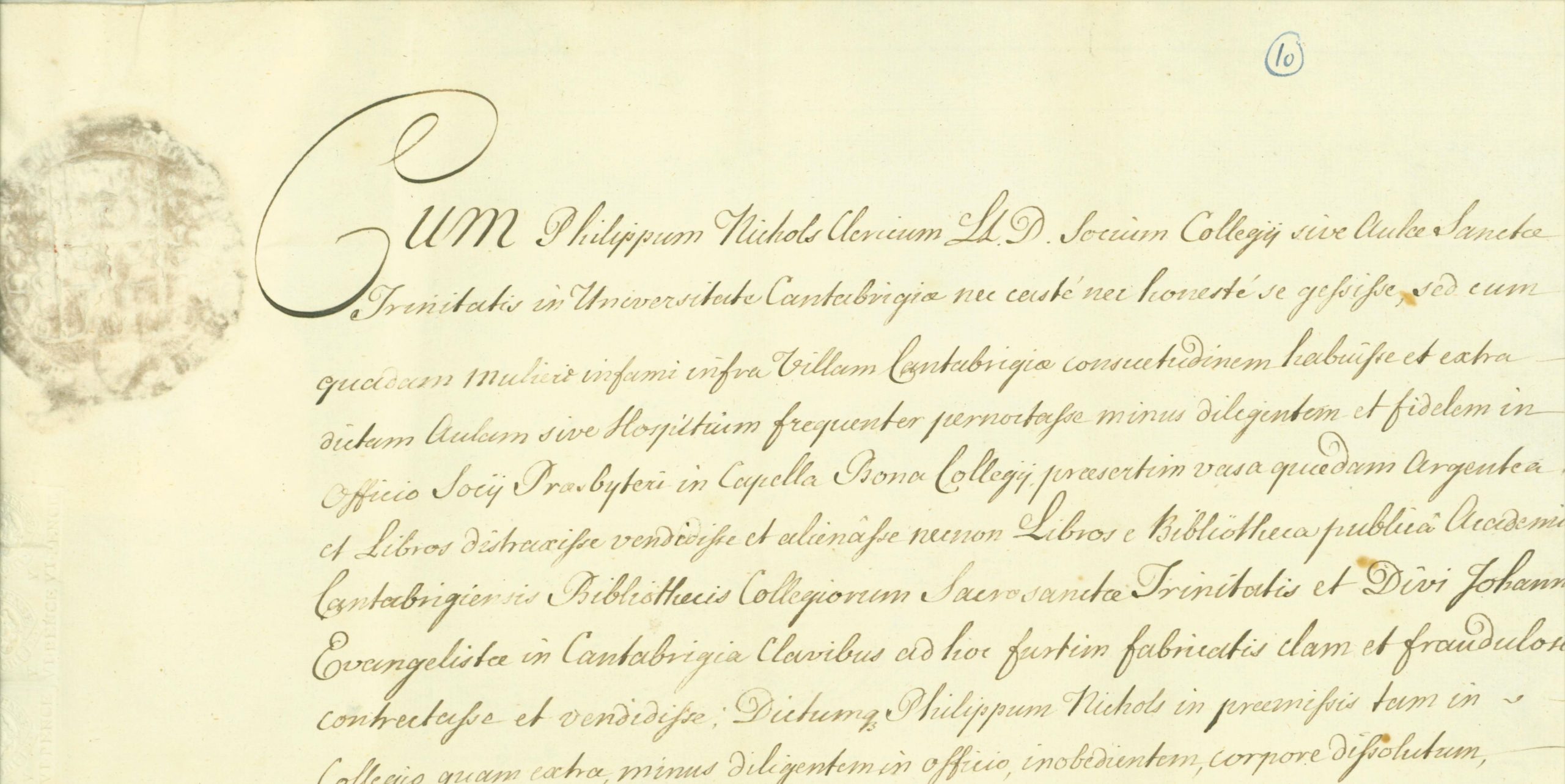In 1731, Philip Nichols was found guilty of stealing books not only from Trinity Hall, but also from the University Library, St John’s, and Trinity College. His treachery was discovered after the Librarian of St John’s College began to realise certain books were missing from his library.
In January 1730/1, the St John’s College Governing Body ordered the lock on their library door to be changed and entrusted one of their fellows, James Tunstall, with the task of hunting down the missing books. Tunstall enlisted William Thurlbourn, a local bookseller who also noticed there were books missing from his shop. Together they made inquiries with London booksellers, watched out for books going up for sale, and looked through past issues of the Daily Post which advertised notices of book sales. Eventually Thurlbourn found an advertisement for a sale in November 1730 of 5 books that matched books missing from St John’s. Nichols made the mistake of giving his real name to the book agent, so when Thurlbourn found the book agent, he was easily able to trace the thefts back to Nichols. On June 14th Thurlbourn confronted Nichols. At first Nichols denied stealing the books, instead saying they were given to him by someone. When Thurlbourn pressed him further, he finally confessed.
Philip Nichols was educated at the ‘other place.’ He matriculated at Brasenose College, Oxford in 1715 at the age of 16 and got his MA in 1722. He was made a fellow of Trinity Hall in 1723, but he was not elected a fellow in the normal way. He was nominated by the Master, Sir Nathaniel Lloyd, who exercised the right of devolution (which was the right of the master to make someone a fellow without the approval of the fellows). After Nichols was found out, Lloyd stated in a letter that Nichols came highly recommended by Dr Irish, a fellow of All Souls College, Oxford, but that “from the very minute [he] first saw him [he] said [he] did not like his look.”[1] Appointing Nichols was a decision he would bitterly regret.

THGB/4/1/8/2/1: Affidavit of Samuel Hadderton, clerk, Fellow of Trinity College, and Keeper of the University Library, Aug 1731
How he stole the books
When Nichols’ room was searched, in addition to a number of books, they also found fourteen keys of various sizes, a pair of pincers, four screws, and a steel file. He used a variety of methods to obtain the books. In some cases he broke into the libraries using the aforementioned tools and in others he used keys that he had copied. One of the College’s cooks testified that Nichols would come to him asking for paste, which he then used to make impressions of the keys. In his letter of apology to the Master of St John’s, he states that he got into the St John’s library using a key he had found and entered the library under the cover of night. One of the keys found in his room did fit the old lock of the St John’s Library.
Some books weren’t even technically stolen because he had legitimately checked them out. Another one of the keys found in his room fit into the University Librarian’s desk, where the notes on borrowed books were kept. It was suggested that instead of stealing books from the University Library, Nichols had borrowed the books normally and then used his key to remove the borrowing records from the Librarian’s desk.


Why he stole the books
It would appear that Nichols had been living a dissolute life for years before he began stealing books. His profligate lifestyle was well known to his peers at Trinity Hall. Nathaniel Lloyd was ashamed of his behaviour and he “long blushed for him.”[1] Lloyd gently admonished him, but Nichols lamented:
“happy had it been for [him] if [he] had then taken the right method, and had put on courage – honestly to confess [his] shame; possibly [he] might then have stopt there, and so have escaped the great load of guilt arising from the several Robberies, wch [he] afterwards most wickedly committed.”[2]
The best explanation for how he came to be in such a desperate situation comes from a letter he wrote to Dr Chetwode in October 19th 1731:
“Tis hard & to you I am sure it wd be tedious to tell by wt insensible degrees I arriv’d to such a height of villany as I did, you are no stranger to the scandalous debauch’d life I had led for some years before, indeed I had extricated my self from that affair & my debts were not so great but that I might have retrieved my self by honest means, but the silly shame of poverty it was that was the cause of my ruin, & push’d me on to all the robberies I afterward committed.”[3]
Once he was found out, he did not linger long. Instead of appearing before the Master of St John’s to beg for forgiveness and plead his case to the Governing Body of Trinity Hall, he first fled to Holland and then to another undisclosed location.

THGB/4/1/8/4: Order of Expulsion of Philip Nichols, Aug 1731
His expulsion from college
Two days after Thurlbourn met with Nichols, the fellows of Trinity Hall and the other librarians involved gathered evidence. By the end of the day, there was little doubt of his guilt. The following day, William Warren, a fellow of the College, wrote a letter to Lloyd describing the situation. On June 22nd, the fellows issued a formal summons to Nichols to attend a meeting of the Governing Body on July 7th to make a case for himself. The citation stated they would proceed even if he did not show up. The citation was repeated two more times, with the last meeting being held on August 3rd. In the final meeting, the witnesses swore to their depositions before the Vice-Chancellor of the University and the evidence was recorded in the presence of a Notary Public. On August 4th, the official expulsion ceremony was performed.
The ceremony of expulsion was quite elaborate. All of the fellows and scholars gathered in the hall and the Master sat at the high table. The bell was tolled and the Master asked each fellow what ought to be done. They all said Nichols should be expelled. The sentence of expulsion was written in Latin and sealed with the College’s seal. Then a card, pasted on the table with Nichols’ name written on it, was to be cut off the table by the College Butler. Apparently this was quite a difficult task, and the Butler wasn’t able to remove the card from the table. Had the card been removed, it would have then been kicked out of the hall. The sentence was also put on the College gates for everyone to see. In addition, Nichols was expelled from the University and deprived of all his degrees.
Although this case was quite the scandal at the time, Trinity Hall and, arguably, the University Library benefited far more than they suffered from the incident. Nathaniel Lloyd felt so guilty about appointing Nichols that he swore to never use the right of devolution again and he gave a considerable amount of money to the College to make amends. That money was used to do substantial building work that transformed the College into what it looks like today. At the University Library, the incident spurred on much needed reform to their borrowing practices. Before, borrowers were not compelled to return their books and could keep them for years at a time. One book found in Nichols’ room had been borrowed seven years before.
Nichols did make his way back to England eventually. He moved to London and began writing for the Biographia Britannica in 1752. In 1763 he was embroiled in another controversy regarding the publication of Bishop Warburton’s letters, and he openly admitted his scandalous past. Nothing else is known about Philip Nichols, the “poor penitent thief.”
[1] Letter from Nathaniel Lloyd to Dr William Warren, June 19th 1731, THHR/2/4/3, p. 70c.
[2] Letter from Nathaniel Lloyd to Dr William Warren, June 19th 1731, THHR/2/4/3, p. 70c.
[3] Letter from Philip Nichols to Nathaniel Lloyd, October 17th 1731, THHR/2/4/3, p. 81.
[4] Letter from Philip Nicholls to Dr Chetwode, October 19th1731, THHR/2/4/3, p. 79b.
References
Chadwick, Owen. “The Case of Philip Nichols.” The Cambridge Bibliographical Society, vol. 1, no. 5 (1953): pp. 422-431.
Miscellaneous Documents, THHR/2/4/3. Trinity Hall Archive, Cambridge.
Trinity Hall v. Philip Nichols, THGB/4/1/8. Trinity Hall Archive, Cambridge.